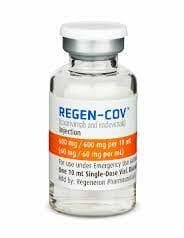
The Food and Drug Administration on Friday revised its emergency use authorization for monoclonal antibody treatment REGEN-COV. It now can be used after exposure to the SARS-CoV-2 virus to prevent severe illness in people at high risk of poor outcomes from COVID-19.
The treatment includes casirivimab and imdevimab, administered together, in patients aged 12 and older weighing at least 88 pounds. The drug combo previously was authorized for reducing the likelihood of hospitalization and severe disease in non-hospitalized patients already ill from the disease. The revised authorization covers highly vulnerable patients in the time between exposure to the virus and development of illness.
Made by Regeneron, REGEN-COV is not authorized for use in preventing COVID-19 before someone is exposed to the SARS-CoV-2 virus, only after exposure to the virus, the agency emphasized.
Monoclonal antibody therapies, usually delivered intravenously, have been found to be very effective in preventing progression to severe COVID-19. Regeneron’s and Eli Lilly and Co’s monoclonal antibody treatments were greenlit for use by the FDA in November 2020. By February, assisted living facilities accounted for 67% of monoclonal antibody treatments for COVID-19, but uptake has not been as high as hoped in other sectors with vulnerable patients and residents.
In June, based on further evidence, FDA halved the treatment dose of REGEN-COV and allowed it to be administered by injection if necessary, rather than by infusion.
The two-drug REGEN-COV therapy is not a substitute for COVID-19 vaccination, the agency cautioned.




